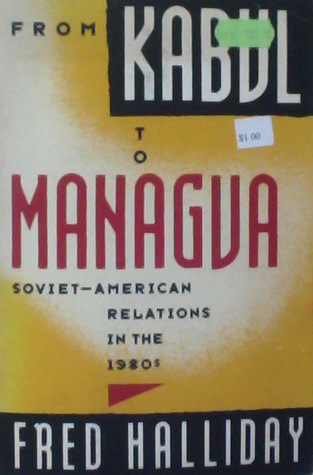

 |

|

The average rating for From Kabul to Managua based on 2 reviews is 3 stars.
Review # 1 was written on 2012-09-10 00:00:00 KIMBERLY OVIEDO KIMBERLY OVIEDOThe fact that this book has not even been reviewed on goodreads is a nice illustration of how messed up and status-driven academia often is. This is a very nitty-gritty study of American foreign policy's search for a coherent grand strategy between the end of the Cold War and the early years of the War on Terror. Brands covers a wide variety of events as well as any historian can do without full access to the relevant documents. Historians, political scientists, and public policy students should make wider use of this thorough, helpful account than they have so far. Brands argues that the containment doctrine of the Cold War gave US foreign policy a coherence and domestic consensus that collapsed when the Cold War ended. The period between Berlin and Baghdad saw the US turn to a variety of alternatives (Bush's NWO, Clinton's Enlargement) that never quite stuck in American politics nor united all aspects of US foreign policy. There were times such as the late 90's where the US didn't try to impose a single coherent grand strategy on its foreign affairs in recognition of the complexity of the world and the multiplicity of issues the US was involved in. While this eschewing of unifying grand strategy may have reflected the world's complexity well, it opened Clinton up to domestic criticism, created confusion and inconsistency in foreign policy, and often left audiences scratching their heads at what Clinton was trying to achieve. I for one usually think that Clinton was pretty solid on foreign affairs. Even though he was not enough of a humanitarian interventionist for my preferences, he did keep the US out many potential conflicts and managed to keep most problems under control Where he failed was in convincing the American people he knew what he was doing and countering Republican arguments/actions against him. Hence the importance of a unifying grand strategic vision. Such a vision returned to American politics and foreign policy in 2001 with 9/11 and the GWOT, which united all aspects of USFP around the vague objective of defeating terrorist groups across the globe. This strategy may have been straightforward and domestically popular in both parties, but Brands points out what a vast oversimplification it was and how it led to some very bad policies (not just the Iraq War, but a coddling of dictatorial allies whose help we needed against terrorist groups, even though the actions of those dictators were one of the main causes of terrorism in the first place). Brands is a rigorous thinker who clearly explains the meaning of grand strategy and its utility for domestic and international politics. Grand strategy acts as a sort of rubric or set of standards that policy makers can look at to weigh the importance of different regions, states, issues, and crises given their relevance to a few overall objectives. When the US has had strong, fairly one-dimensional (GWOT, containment), they have not always been able to reduce the complexity of the world or even address many issues, but they did impose structure on American thinking about the world. Overall, the book gets at the necessity of grand strategic thinking in foreign and domestic politics, but also the fact that a unified grand strategy may simply be wrong and lead the US down a dark and counterproductive path. |
Review # 2 was written on 2015-08-08 00:00:00 Vincent Ruscavage Vincent RuscavagePainful chronicle of the black male underclass of the USA in the 1940s. Written in the 60s by Robert Beck who lived a similar life of crime in the same era and later went straight and became a writer. The “Trick Baby” of the title is the very pale skinned son of a black woman who gets whacked by racism from both sides – and sometimes shares the insider talk on both sides of the race line. What I liked about it was its no-holds-barred directness about how a life of crime can get chosen without evil intention, and how powerful and ubiquitous racism is in cutting off black people’s choices. What I didn’t like was the uncritical way the story slings around male sexism that is really on a par with racism in its brutal and unconscious judgement and treatment of those outside the relatively privileged group. |
CAN'T FIND WHAT YOU'RE LOOKING FOR? CLICK HERE!!!